How Ojibwe tribes in Wisconsin resisted efforts to deny treaty rights
A history of deception and coercion threatened the tribal rights of Ojibwe people to hunt and fish in the Great Lakes and inland territory.
Wisconsin Watch
April 12, 2023 • Northern Region

The crew of the fish tug, Ava June, pick cisco, or lake herring, from gillnets after lifting them from Lake Superior during a fishing run near the Apostle Islands in Wisconsin, on Nov. 15, 2022. Ojibwe tribes retain a treaty-guaranteed right to fish within what's called the Ceded Territory: portions of three Great Lakes and millions of acres stretching across northwestern Michigan and its Upper Peninsula, northern Wisconsin and northeastern Minnesota. But the tribes throughout history have faced deception, violence and coercion in efforts to protect those rights. (Credit: Bennet Goldstein / Wisconsin Watch)

This article was first published by Wisconsin Watch.
Ojibwe tribes have fished in the Great Lakes for centuries, but throughout their histories, have faced numerous incursions and displacements — possibly including the circumstances that led to their migration to the region.
“We originated on the East Coast, near the Great Salt Water,” said Edith Leoso, retired tribal historic preservation officer with the Bad River Band of Lake Superior Ojibwe. “There was this spirit entity that came to us and said that there was a light-skinned race that would come from where the sun rises and that upon their coming, our way of life would be jeopardized.”
The Ojibwe, and the related Ottawa and Potawatomi peoples, also refer to themselves as Anishinaabe, which has several meanings, including “original person,” “the people” and “from whence descended man.”
One telling of the migration story begins when prophets told the Anishinaabe that a sacred shell would guide them westward from the Atlantic Coast to a place where food grows on top of the water. They would stop to rest seven times.
The final stopover occurred at what would come to be called Madeline Island, the largest of Lake Superior’s Apostle Islands. The location is considered a spiritual center for Anishinaabe nations. To the south in the Kakagon Sloughs, manoomin, or wild rice, still grows at the water’s surface.
Tribes cede territory through treaties
By the mid-1800s, the United States sought to acquire the territory, rich with timber and minerals, through treaties with Ojibwe bands living in present-day Michigan, Minnesota and Wisconsin. A succession of treaties, negotiated with the federal government in 1836, 1837, 1842 and 1854, established the Ceded Territory.
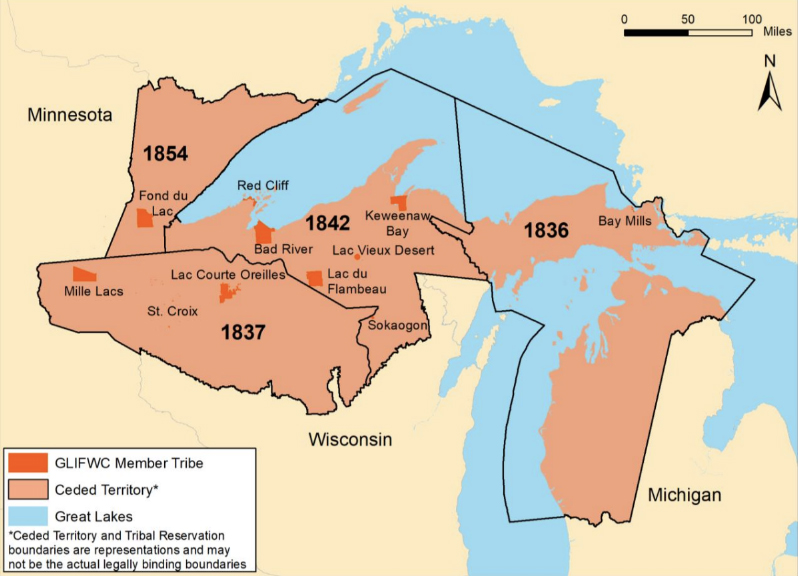
The four Ojibwe Ceded Territories — as stipulated by treaties forged in 1836, 1837, 1842, and 1854 — are shown. (Credit: Courtesy of Great Lakes Indian Fish and Wildlife Commission)
It is a misconception that the government granted Ojibwe tribes treaty rights. On the contrary, the Ojibwe tribes retained rights to hunt, fish and gather and granted other rights to the United States.
Henry Dodge, the first governor of the Wisconsin Territory, helped oversee the 1837 negotiations, as chronicled by historian Ronald Satz. Federal officials offered to pay tribes $800,000, distributed in annuities over 20 years. The 1842 treaty called for the disbursement of about $800,000 more, across 25 years.
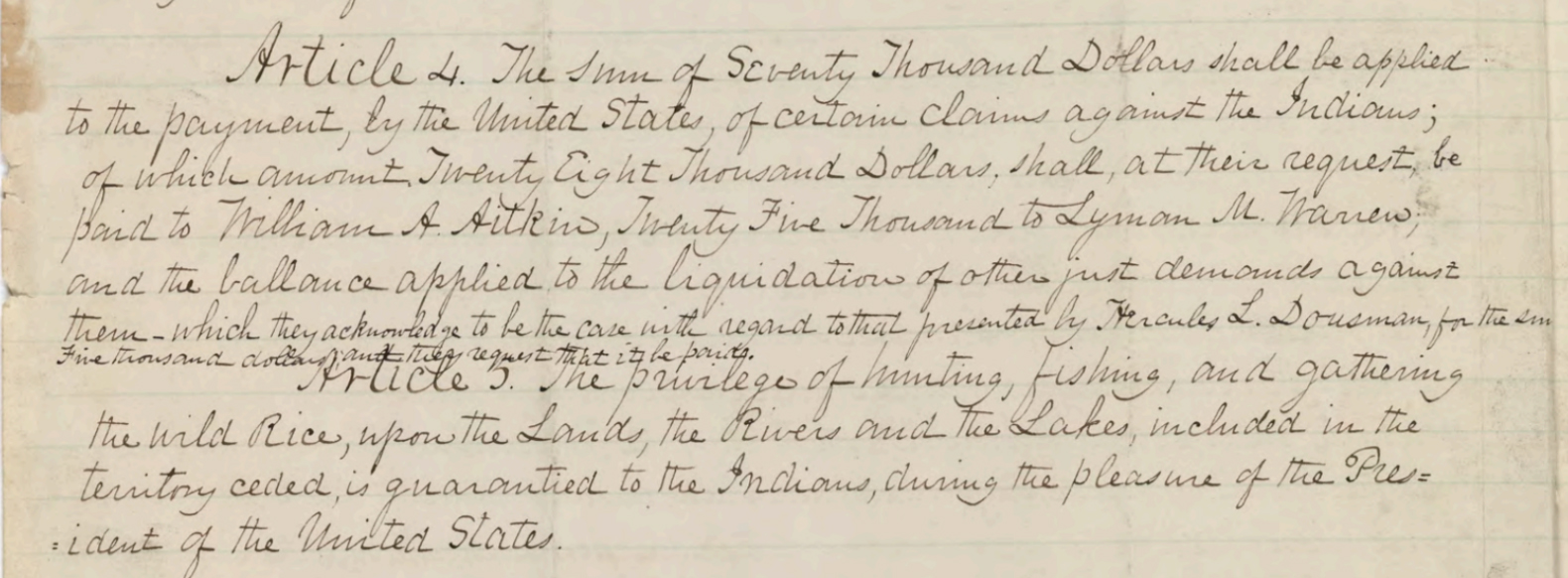
A portion of an 1837 treaty between the United States and multiple Ojibwe bands from the Great Lakes region is shown. The treaty was signed at the confluence of the St. Peters and Mississippi rivers.
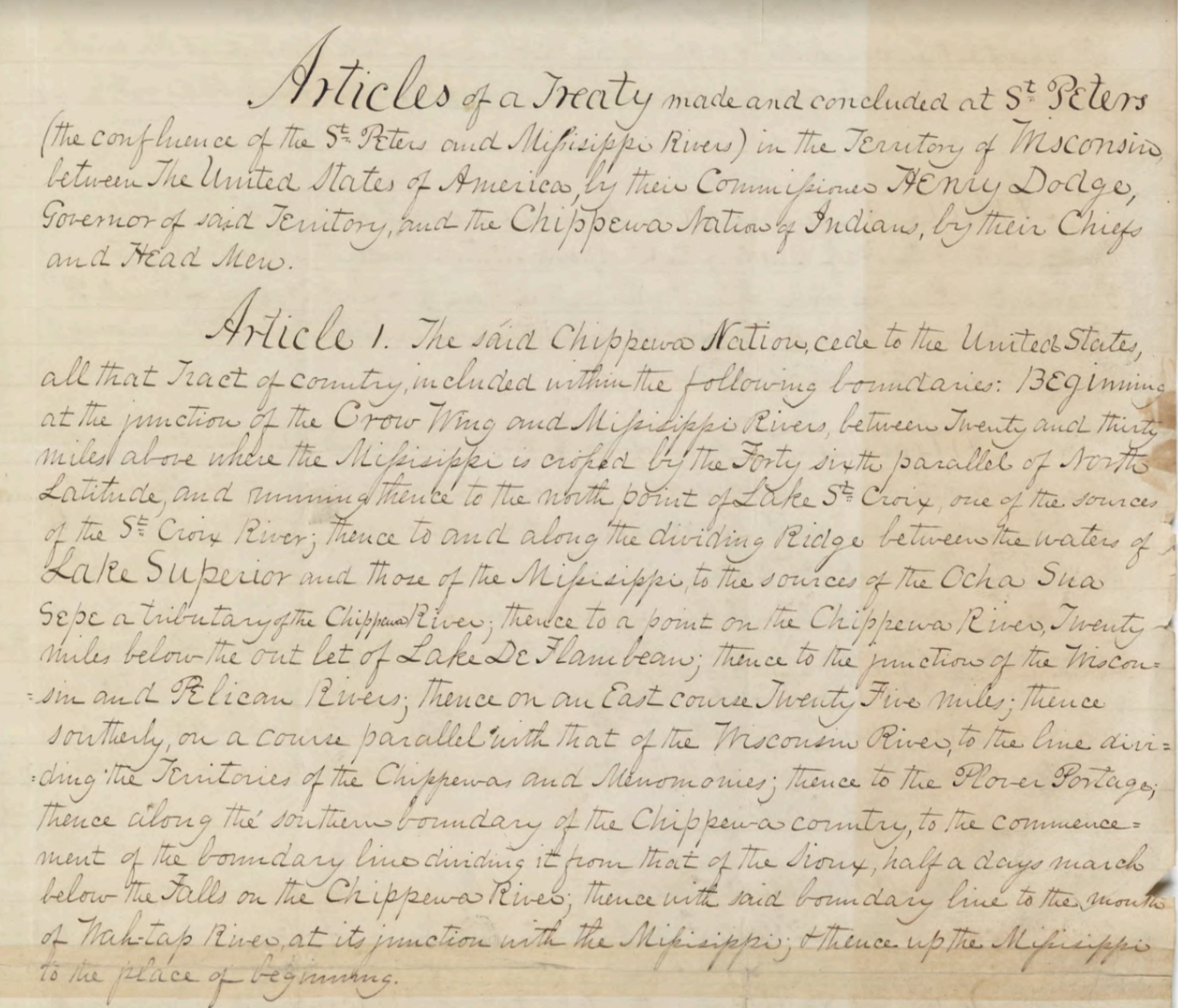
Portions of an 1842 treaty between the United States and the Ojibwe tribes of Wisconsin are shown. The treaty was negotiated at La Pointe on Madeline Island, the largest of Lake Superior’s Apostle Islands and a spiritual center for Anishinaabe nations.
Ojibwe tribes would cede more than 22,000 square miles of land within Wisconsin alone, in addition to nearly 14,000 square miles of Lake Superior’s waters.
Chiefs believed they faced coercion and deception during negotiations, historical records show. Ojibwe delegations thought they were enabling the Americans to use their lands for lumbering and copper mining, not relinquishing ownership of them nor agreeing to leave.
Forced removal and ‘Wisconsin Death March’
The tribes had been assured in 1842 they could remain in Wisconsin so long as they “lived on friendly terms with the whites,” but in February 1850, President Zachary Taylor revoked the Ojibwe bands’ treaty rights through an executive order. He ordered their removal to the unceded Minnesota Territory to open Wisconsin to white settlement.
That autumn, federal officials attempted to dull dissent from the Wisconsin Ojibwe tribes by requiring them to travel to Sandy Lake, in Minnesota, to receive their annuity. Previous payments occurred at Madeline Island in northern Wisconsin.
Federal officials did not arrive at the lake as scheduled and failed to provide promised rations. Hundreds of Ojibwe people died from exposure to cold weather, famine and infectious disease.
The incident, which one scholar has called the “Wisconsin Death March,” set into motion events leading to the Treaty of 1854, which established, at the insistence of tribal leaders, permanent reservations for four Ojibwe tribes in Wisconsin. Before that occurred, however, several Ojibwe leaders, including Chief Buffalo of the La Pointe band, traveled to Washington to petition Taylor’s successor, President Millard Fillmore, to rescind the removal order.
Treaty rights ignored, discarded
Still, Ojibwe people faced obstacles in exercising their treaty rights over the next 150 years, fueling ongoing advocacy.
While the U.S. Constitution holds that state laws are subordinate to the founding document, federal law and treaties, Wisconsin increasingly exerted control over the Ojibwe tribes, asserting they were subject to state fishing and hunting regulations.
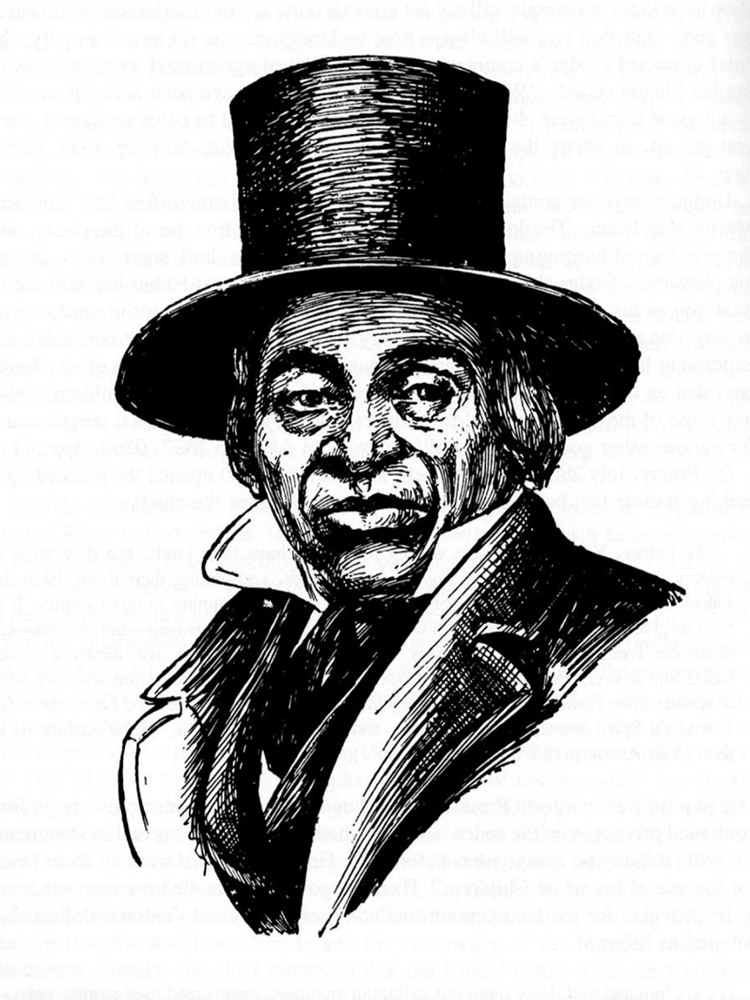
Chief Flat Mouth, of the Pillager band from Leech Lake in Minnesota is shown in an illustration. “You know that without the lands, and the rivers and lakes, we could not live,” he told government officials while negotiating an 1837 treaty. “We hunt and make sugar and dig roots upon the former, while we fish and obtain rice and drink from the latter.” (Credit Courtesy of the Wisconsin Historical Society, WHI-156611)
Meanwhile, federal allotment policies — designed to encourage private land ownership and farming among tribal citizens — dramatically reduced tribal landholdings nationwide, shrinking the jurisdictions in which Indigenous nations could exercise their sovereignty.
The Dawes Act of 1887 granted citizenship to American Indians who took allotments. Great Lakes states continued to call treaty rights moot, reasoning that Indians fell under their jurisdiction when they became citizens. In 1908, the Wisconsin Supreme Court dismissed the treaties altogether, ruling that Wisconsin’s admittance to the union had invalidated them 60 years earlier.
By the early 20th century, historian Chantal Norrgard writes, commercial fishing had decimated several fish species on Lake Superior, prompting states and the federal government to regulate everything from fishing seasons to net sizes.
Alongside ecological concerns, efforts to preserve fisheries for tourism motivated the passage of new protections and hiring of wardens to enforce them.
Large fishing companies also exerted their influence in the passage of legislation, fearing competition from independent and tribal operators. Both industry and the state viewed treaty rights as a threat.
Tribes defeat Apostle Islands National Lakeshore relocation plan
As government actors sought to regulate Ojibwe communities’ harvest, some federal officials sought to relocate tribes from their reservations.
In the late-1960s, the Bad River and Red Cliff bands, two of six federally recognized Ojibwe tribes in Wisconsin, defeated plans by then-U.S. Sen. Gaylord Nelson, a former Wisconsin governor, to appropriate reservation land to create the Apostle Islands National Lakeshore.
The plan would have relocated the tribes inland, with potential termination of their hunting and fishing rights within the new park.
“The only way that the state can think of to increase access for non-Native tourists to the lands and to the resources on the lands is to restrict the access of Native people,” said Katrina Phillips, an associate professor of history at Macalester College and a Red Cliff citizen.
Court rulings affirm treaty rights
Throughout the 20th century, states punished Ojibwe people for hunting or fishing on reservations or within the Ceded Territory. They challenged their citations and arrests in court.
Landmark rulings would affirm the Ojibwe tribes’ treaty rights — the 1972 Gurnoe decision, the right to fish in Lake Superior. The 1983 Voigt decision applied to inland lakes within the Ceded Territory, along with other forms of harvest.
Still, harassment of Indigenous fishers continued during Wisconsin’s violent Walleye Wars of the late 1980s and early 1990s, and it has persisted to a lesser extent in recent years.
Red Cliff land repatriation
The Red Cliff Reservation now spans more than 15,000 acres, but the tribe does not own all of those lands.
As of 2006, the tribe only held property rights to slightly more than half. The rest was a checkerboard of public and private plots within the reservation boundaries. For example, when Congress created the national lakeshore in 1970, it designated several miles of coast — about 10% of Red Cliff Reservation lands — as the mainland portion of the park.
But in an assertion of sovereignty, Phillips wrote, Red Cliff repatriated other properties within and outside its borders. In 2012, it opened the tribally managed Frog Bay Tribal National Park, the first of its kind in the United States. The park includes an 89-acre parcel of former reservation land that was repatriated that year and a second, 86-acre parcel, acquired in 2017.
The tribe’s repatriation of formerly held reservation lands in the ensuing years, including 1,582 acres of forest owned by Bayfield County, represents a continued exercise of self-determination, Phillips said.
“That history of advocacy — it’s not something that just kind of came out of nowhere,” she said. “It’s been there for centuries.”
This story is a product of the Mississippi River Basin Ag & Water Desk, an editorially independent reporting network based at the University of Missouri School of Journalism in partnership with Report For America and funded by the Walton Family Foundation. Wisconsin Watch is a member of the network. Sign up for our newsletter and donate to support our fact-checked journalism.
 Passport
Passport




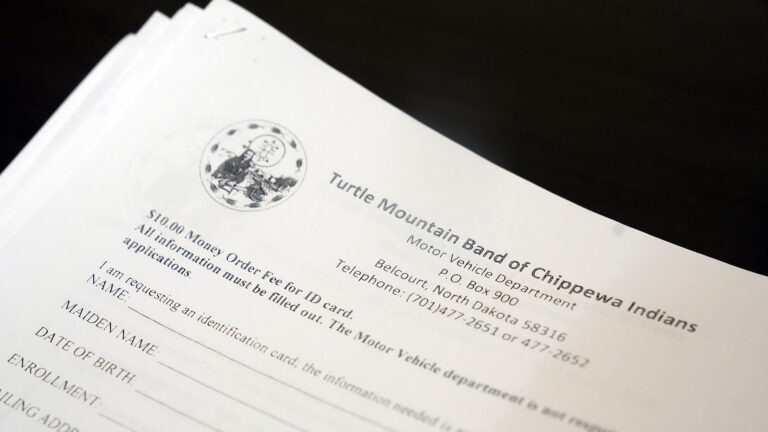
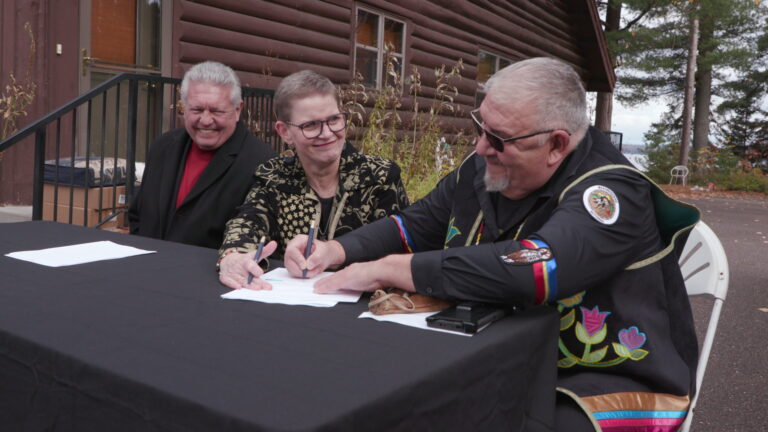

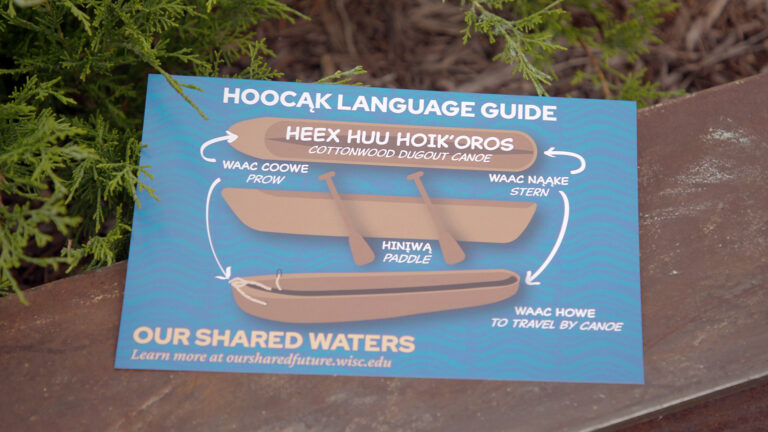



Follow Us